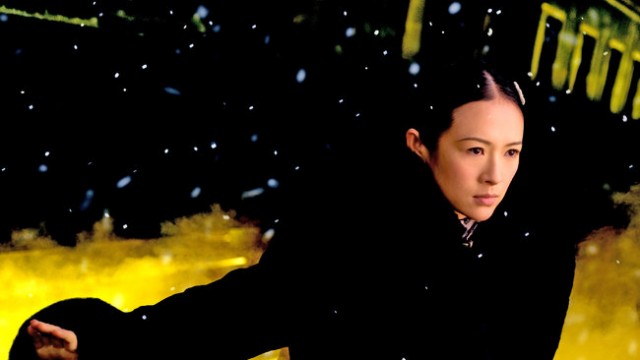Each year, the Academy of Motion Picture Arts and Sciences releases a shortlist of foreign language films that are eligible for an Academy Award. For more on how the process works, click here. In anticipation of that event, we will look at 2013’s nine shortlisted films. Go here for previous installments. This week is Hong Kong’s official selection, The Grandmaster.
Director Wong Kar-wai’s masterpiece, The Grandmaster, is a visually dazzling martial arts epic, but it is also a tender romance, a chronicle of the troubled history of China and Hong Kong and an homage to Old Hollywood.
The Grandmaster tells the story of legendary Kung Fu master Ip Man (Tony Leung) , who is best known in the West as Bruce Lee’s teacher. The film begins when Man, who was an expert in the Wing Chun style of Kung Fu, becomes the grandmaster of the south. Man then receives an honorary visit from the grandmaster of the North, who brings along his daughter, Gong Er (Ziyi Zhang). The pair fall in love and the rest of the film chronicles their fate during World War II (Mainland China was invaded by Japan) and their exile to Hong Kong.
That synopsis makes The Grandmaster seem like another boring biopic, but it is so much more than that. Wong uses the outline of Man’s life for a series of dazzling set pieces. The film begins with a martial arts battle in the rain that is at once an amazing display of athletic skill and an homage to Old Hollywood musicals and gangster films. Leung strides out to battle in a snazzy suit and white fedora that would have made George Raft proud. Leung is as cocky as James Cagney, but once he begins to swoop and soar over the rain-soaked streets, he becomes as graceful and elegant as Fred Astaire (the martial arts sequences were brilliantly choreographed by Yuen Woo-ping).
The second half of The Grandmaster is dominated by Gong Er’s storyline (one critic suggested that the film should have been called “The Grandmistress”). Actually, it’s easy to understand why Wong focused on this character. The ageless Zhang (seriously she looks exactly the same as she did in Crouching Tiger, Hidden Dragon) is a true movie star. She is of course beautiful and a highly skilled martial artist, but she also has a mysterious quality that compels the audience to watch her performance. At one point, she delivers a long speech about lost love that on paper is as corny as a Hallmark greeting card, but thanks to her understated yet moving delivery becomes a truly heartbreaking moment in the film.
The Grandmaster was Wong’s dream project, but it took him many years to make the film. He had difficulty obtaining financing and once he got the money together, Leung was sidelined by injuries for awhile. Wong has had other troubles as well. The Weinstein company purchased the U.S. rights to the film and they promptly cut out about 20 minutes from Wong’s version of the film for American audiences (there are actually three cuts of The Grandmaster as outlined in this excellent article). The U.S. version is the only one I have seen (it’s the version streaming on Netflix), but I plan on seeking out the Wong’s cut in the near future.
The Grandmaster was not one of the five films that made the official Oscar ballot. That decision is inexplicable because The Grandmaster is much better than all the films that were nominated with the exception of The Great Beauty. The snub was probably because of the wonkiness of the foreign language nominating process (there are three separate Academy committees involved), but still it’s hard to understand how anyone with a pair of eyes could think that something like The Broken Circle Breakdown was better than this film. Oscar voters did somewhat make up for the slight by nominating Philippe Le Sourd for Best Cinematography and William Chang for Best Costume Design.
Grade: A+. This is a masterpiece from one of the most talented auteurs working today. There isn’t a single criticism I can make about this truly wonderful film.
The Grandmaster is available on Netflix Instant.
Next week I’ll review The Notebook from Hungary.

